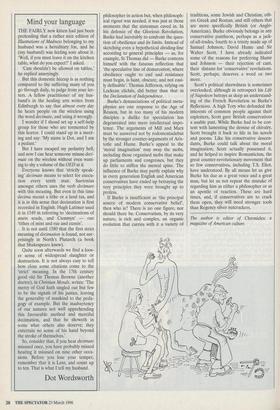Mind your language
THE FAIRLY new kitten had just been pretending that a rather nice edition of Illustrations of Madness belonging to my husband was a hereditary foe, and he (my husband) was feeling sore about it. `Well, if you must leave it on the kitchen table, what do you expect?' I asked.
`Cats shouldn't be allowed on tables,' he replied annoyingly.
But this domestic hiccup is as nothing compared to the suffering many of you go through daily, to judge from your let- ters. A fellow practitioner of my hus- band's in the healing arts writes from Edinburgh to say that almost every day he hears people on the wireless using the word decimate, and using it wrongly.
I wonder if I shoud set up a self-help group for those who are tormented by this horror. I could stand up in a meet- ing and say: 'My name is Dot, and I am a pedant.'
But I have escaped my pedantry hell, and now I can hear someone misuse deci- mate on the wireless without even want- ing to shy a volume of the OED at it.
Everyone knows that 'strictly speak- ing' decimate means to select for execu- tion every tenth man. Suetonius amongst others uses the verb decimate with this meaning. But even in this time decima meant a tithe or a land tax, and it is in this sense that decimation is first recorded in English. Hugh Latimer used it in 1549 in referring to 'decimations of anets seade, and Cummyn' — our `tithes of mint and rue and cumin'.
It is not until 1580 that the first strict meaning of decimation is found, not sur- prisingly in North's Plutarch (a book that Shakespeare knew).
Quite soon afterwards we find a loos- er sense of widespread slaughter or destruction. It is not always easy to tell how close some citations come to the `strict' meaning. In the 17th century good old Sir Thomas Browne (another doctor), in Christian Morals, writes: 'The mercy of God hath singled out but few to be the signals of his justice, leaving the generality of mankind to the peda- gogy of example. But the inadvertency of our natures not well apprehending this favourable method and merciful decimation, and that he showeth in some what others also deserve; they entertain no sense of his hand beyond the stroke of themselves.'
So, consider that, if you hear decimate misused once, you have probably missed hearing it misused on nine other occa- sions. Before you lose your temper, remember that it is Lent, and count up to ten. That is what I tell my husband.
Dot Wordsworth


































































 Previous page
Previous page